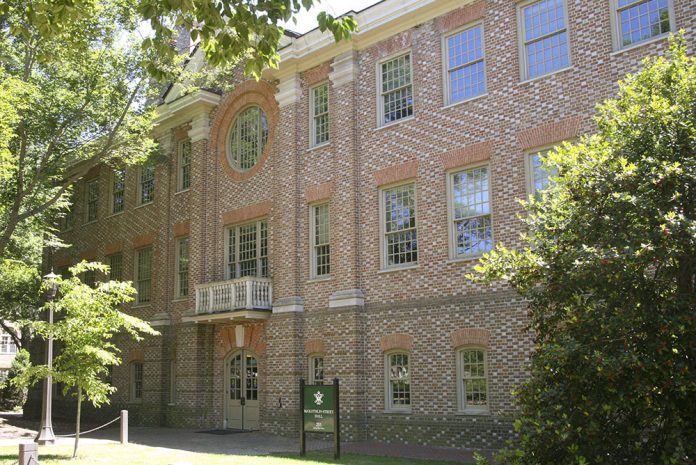In response to years of limited course availability, the College of William and Mary’s computer science department intends to hire five new faculty members for the fall 2019 semester and utilize state resources provided by a new statewide initiative.
The College’s computer science department was once eclipsed by larger STEM-focused disciplines but has expanded in the past decade. Only 12 computer science majors graduated in 2010; nine years later, the number of students leaving the College with a bachelor’s degree in computer science has increased by over 600 percent. Now, the department graduates upwards of 75 computer science majors each year. Department chair and professor Robert Lewis attributes this increase to demand for competitive compensation as well as the proliferation of computer-based technologies.
“It’s not just the fact that the jobs [in computer science] are well-paying jobs,” Lewis said. “... The way this stuff is getting used everywhere, machine learning, artificial intelligence, sensor data, you name it … [it’s] got a computer attached to it somehow.”
“It’s not just the fact that the jobs [in computer science] are well-paying jobs,” Lewis said. “... The way this stuff is getting used everywhere, machine learning, artificial intelligence, sensor data, you name it … [it’s] got a computer attached to it somehow.”
Lewis said that a typical registration period sees over 300 unique override requests from around 180 students. While many of these override requests originate from computer science majors seeking to fulfill their graduation requirements, increased demand among non-majors — often students pursuing similar disciplines like applied mathematics, economics and data science — intensifies the department’s competitive registration process.
“The focus is [to] make sure that [computer science] majors graduate in four years … that’s been the top priority in making sure that happens,” Lewis said. “… And then trying to deal with minors, certainly people in areas like math or applied math who need classes for proficiencies to graduate … it doesn’t leave a lot of leftover space.”
The department organizes override requests with an online application form. Although the department attempts to accommodate the largest quantity of students using this process, its limited course availability necessitates the rejection of many requests.
“We collect so many of them that we have to go through them by hand, it’s a very laborious process and unfortunately, we have not been able to … solve a lot of the problems in the last few years,” Lewis said.
While tedious for faculty, overrides are frustrating for students as well. Alex Fantine ’21, a computer science major, said that professors frequently resort to rejecting overrides even from students within the department.
“I remember one time trying to override into a CS class and I got an email back saying there was a list of over 100 requests and that they were going to have to wait to give overrides,” Fantine said in an email.
“I remember one time trying to override into a CS class and I got an email back saying there was a list of over 100 requests and that they were going to have to wait to give overrides,” Fantine said in an email.
The department’s reluctance to lift caps on student enrollment in introductory classes adds another dimension of difficulty in accommodating override requests. Unlike other STEM disciplines where preliminary courses can be offered in lecture-style environments with hundreds of students, the hands-on, project-based nature of computer science — especially in introductory classes like CSCI 141 Computational Problem Solving — necessitates a more intimate classroom setting.
“We’ve tried to keep the [introductory] classes from getting enormous,” Lewis said. “… [At] a lot of universities around the country, one of the responses to big enrollments is just to make the intro classes really huge, like 300, 600, 900 students … I just don’t think that’s the right way to do it.”
Rachel Oberman ‘20, a double major in computer science and data science at the College, argues that the pressure to compete with students from a myriad of different majors while seeking enrollment in introductory classes has complicated her journey through the department and occasionally sparked anxieties about on-time graduation.
“I believe everyone pursuing a CS degree at one time or another has been worried about fulfilling requirements on time. …” Oberman said in an email. “… You really need to strategically plan when you are taking specific classes.”
Lewis believes that computer science’s limited course availability will improve following the addition of five new faculty members. According to Lewis, these new professors — who are currently in the process of being hired by the department before the fall semester — will teach introductory, intermediate and advanced courses, increasing the department’s supply of open seats at all levels of the discipline.
Alongside the planned expansion in faculty, the department plans to take advantage of funding offered through the Tech Talent Investment Program and Fund, which is a pilot statewide program designed to add at least 25,000 graduates in computer science and computer engineering at Virginia’s institutions of higher education by 2039.
Before funding can be allocated, the Tech Talent program requires that universities enter a formalized memorandum of understanding with the state to enshrine expectations regarding degree production goals and eligibility requirements.
The grant program passed both the Virginia House of Delegates and the Virginia Senate March 7. After being signed by Virginia Gov. Ralph Northam March 19, the initiative’s impact on the College’s computer science department is subject to negotiation between university officials and the state. It is currently unclear what specifically will change at the department given the lengthy process of drafting a memorandum, but according to Lewis, the ramifications could be significant.
“[The program] should have many tens of millions of dollars available. …” Lewis said. “… We don’t know how exactly it’s going to work, but the state does seem very serious about this.”


[…] Computer science department faces 300 unique override requests […]